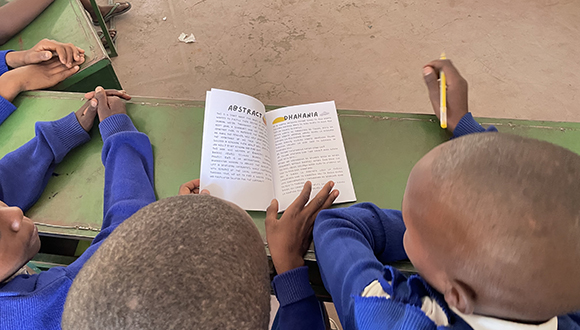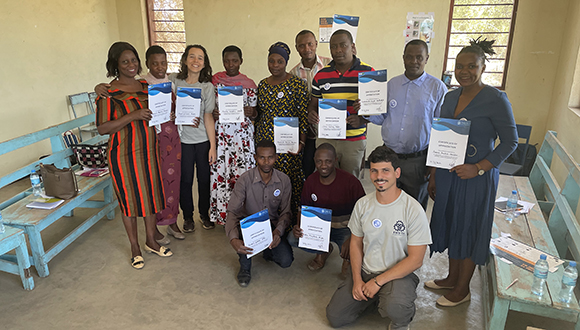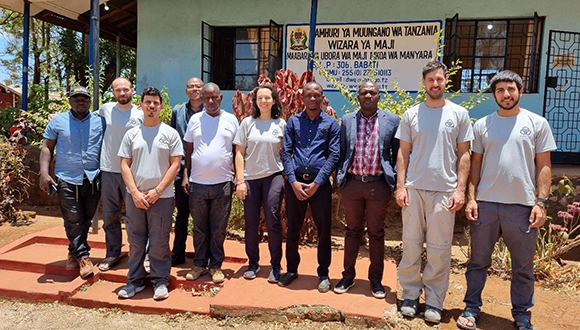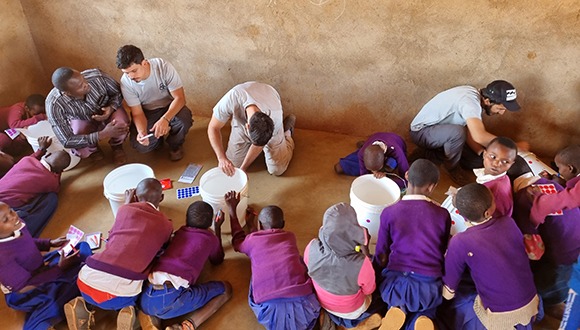
TAU Students Continue to Work on Solving the Water Crisis in Northern Tanzania
The delegation “Africa Group, Engineers Without Borders Israel – Tel Aviv” went to Tanzania during the country’s worst droughts in history
Tel Aviv University students from The Iby and Aladar Fleischman Faculty of Engineering and the Raymond & Beverly Sackler Faculty of Exact Sciences recently returned from the Babati district in northern Tanzania, where they worked to supply safe drinking water to the local rural population. The students are part of a team of 20 volunteers from various fields and degree levels, called “Africa Group, Engineers Without Borders Israel – Tel Aviv”.
The solution TAU students bring to Tanzania’s water shortage problem is simple and sustainable: through hefty use of the roofs of the regional schools, water can be stored in low-cost rainwater harvesting containers to meet the needs of the children throughout the dry season. The team uses several simple filters and chlorine tablets for storage.
Throughout the year, when TAU volunteers are in Israel and busy with their studies, they still find time to manage all the different aspects of the project, including its fundraising and marketing needs as well as the systems’ construction and implementation. This time around, the students were in Tanzania while the country experienced a severe drought, which resulted in a water crisis and severe hunger.
“During the expedition, we preserved and upgraded our water systems, which at this point provide water to 5,000 children in six schools. We also conducted several pilots for water purification systems; cultivated relationships with organizations that operate in the Babati district; and delivered an extensive educational program on water and sanitation issues together with our local partners. We also visited the area’s new water laboratory (together with the local water authorities). The new lab will be carrying out water tests for us, including in new areas where we are looking to operate in,” say delegation members Aviv Avinoam, Yaeli Benovich, Dan Komiserchick, Sharon Berkovich and Offir Inbar.

Children who get to drink clean water and participate in an extensive educational program on water and sanitation issues
A New Meteorological Station and Empowering School Management
According to Dan Komiserchick, more accurate meteorological data is needed in the Babati district. The team, therefore, together with the local community, installed the first automatic meteorological station in the region, which will be helpful for the planning of future water systems. The station measures parameters such as rain, wind, humidity, and temperature, and the information gathered is transmitted to the water authorities and local farmers and organizations.
One of the highlights of the delegation was organizing a first-of-its-kind executive seminar for all school principals in Babati. “Investing time and resources in training and empowering school principals is critical for the success of the project, as the school principals are very involved in all aspects of the operation of the water purification systems,” explains Aviv Avinoam. “The main topics discussed were maintenance of the systems; insights and suggestions for improvements; educating the students about water safety and training the teachers. The discussions were very enlightening and productive, and it was decided (in agreement with the regional director of education) that the seminar will be held on an annual basis going forward.”
“We also expanded the existing educational program by collaborating with local organizations and creating instructive content on topics like ‘How is rain created?’, ‘Seasons of the year’, ‘How to build water systems’, ‘What pollutants are present in water?’ and more.”

Principals’ Seminar, October 2022
No Room for White Elephants
The team is also conducting a comprehensive academic study to examine the impact of the water systems on the local communities throughout the years, in terms of health, nutrition, entrepreneurship, and more.
The research is led by Yaeli Benovich, who is writing a thesis on the subject with the guidance of Prof. Dror Avisar, Head of the Water Research Center at Tel Aviv University, and Dr. Shira Bookchin from the Hebrew University of Jerusalem, who researches interdisciplinary aspects of sustainability in the developing world.
As part of the research, hundreds of students and educators answered questionnaires aiming to ensure that the activities of Engineers Without Borders are not causing any harm, and making sure that the water project does, in fact, benefit the community. The research adds a professional and academic dimension to the ongoing project and examines the impact of the systems in a broad perspective.
“Visiting the schools and building the water purification systems is only half of the job,” emphasizes Yaeli Benovich. “A lot of projects initiated in Africa quickly turn into so-called ‘white elephants.’ Typically, some foreign organization arrives, pours some money out and leaves the country. Shortly thereafter, the project is abandoned and terminated. We seek to avoid such a situation, by involving the local authorities and the communities as part of the planning and construction of the systems already from an early stage. We are very clear from the start that the local community is responsible for the project.”
Over the years, the Engineers Without Borders delegations have conducted dozens of meetings with the local authorities, including village leaders, heads of the districts and members of parliament. Additionally, they’ve cultivated a close relationship with the local water authorities.
“We signed a contract this year, a memorandum of understanding (MOU), which clearly outlines the role each party has for the success of the project. This contract guides our cooperation with the local representatives,” explains Yael. “The document lists all the responsibilities of our team, as well as those of the local authorities and community – before, during and following the construction of any water purification system. Introducing these written agreements has had a very positive impacted on the contributions by the local authorities and community. There’s no doubt that this is the right way to work. It is a necessary step that will help the community to maintain the project over the years.”

Members of the delegation during a tour of the new water laboratory of Babati district
Offir Inbar shares that in this type of projects, the team’s presence on the ground is critical: “It is only when you physically present and meet with people face to face that you fully understand the situation, the people involved, the challenges at play and in what direction one should be heading.”
“It is hard to bridge various gaps over Zoom conversations or messages. Close relationships are formed by sitting down and talking together at eye level. When you sit down and talk everything seems much simpler – opportunities emerge, you meet with organizations and key people who may lead you to form new connections. It is the only way to fully grasp the challenges facing the local community. Sometimes the challenges on ground are different from what we imagine from afar.”

Close relationships are formed by sitting down and talking together at eye level. An educational activity with school children on the importance of hygiene
Help Ensure the Supply of Water to an Additional 1,000 Children
The drought that hit Africa during the past nine months has emphasized the importance of creating a variety of water solutions. “On our next expedition to Tanzania, planned for April 2023, we will install two new water purification systems to provide clean water to a thousand more children,” says Sharon Berkovich.
“One of the systems will be based on rainwater and the other on the use of filters. The filter system will provide a solution for areas where groundwater or surface water sources exist, but where these are contaminated by bacteria that harm the health of the local community.”
The project is funded mainly by donations from Tel Aviv University, private companies and individual businessmen, philanthropic foundations, and the Embassy of Israel in Kenya. A significant fundraising operation is currently taking place for the upcoming expeditions.
Featured image: Local women collecting water from a polluted water source, drying up in Tanzania
